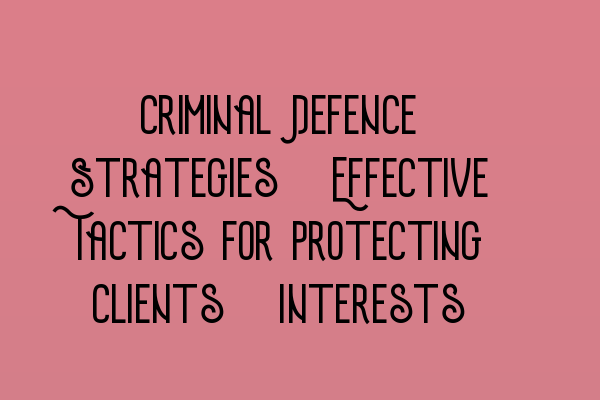Criminal Defence Strategies: Effective Tactics for Protecting Clients’ Interests
As criminal defense solicitors at SQE Criminal Law & Practice Law UK, we understand the importance of employing effective strategies to protect our clients’ interests. Every case is different, and it requires a tailored approach to navigate the complexities of the criminal justice system. In this article, we will explore some of the most effective tactics used in criminal defense, ensuring our clients receive a strong representation and fair outcomes.
1. Thorough Case Investigation and Preparation
One of the key elements of criminal defense strategy is to conduct a thorough investigation. Our team of experienced solicitors leaves no stone unturned, gathering evidence, interviewing witnesses, and examining the prosecution’s case. This comprehensive preparation enables us to identify any weaknesses or inconsistencies, which can then be strategically used to challenge the prosecution’s case and protect our clients’ interests.
2. Building a Strong Defense Theory
Developing a strong defense theory is crucial in criminal defense cases. By understanding the facts, analyzing the evidence, and applying our legal knowledge, we can construct a defense theory that best supports our clients’ innocence or mitigating circumstances. This theory guides our approach throughout the case, ensuring every action taken is aligned with our objective of protecting our clients’ interests.
3. Skillful Cross-Examination of Witnesses
In many criminal cases, witness testimony plays a significant role. Skillful cross-examination is an essential tactic used to challenge the credibility, accuracy, or reliability of witness statements. By meticulously interrogating witnesses, we can bring out inconsistencies, biases, or ulterior motives that may undermine the prosecution’s case. Our cross-examination skills enable us to cast doubt on the prosecution’s evidence and strengthen our clients’ defense.
4. Negotiating Plea Deals
In some cases, it is in our clients’ best interests to negotiate a plea deal. This strategy involves entering into discussions with the prosecution to secure a more favorable outcome. Our expertise in negotiation and knowledge of the criminal justice system enables us to navigate plea deal negotiations effectively. By carefully weighing the risks and benefits, we can advise our clients on whether accepting a plea deal is the right decision for their particular circumstances.
5. Expert Testimony and Forensic Analysis
Where necessary, we employ the use of expert witnesses and forensic analysis to strengthen our defense. Expert testimonies can provide vital insights and interpretations of complex evidence, which can support our clients’ innocence or challenge the prosecution’s case. Forensic analysis, such as DNA testing or ballistics examination, can uncover discrepancies or alternative explanations that may cast doubt on the prosecution’s version of events. This combination of expertise and scientific evidence is a powerful defense tactic in protecting our clients’ interests.
6. Staying Updated with Legal Developments
As criminal defense solicitors, it is crucial for us to stay updated with the latest legal developments, precedents, and case laws. By continuously enhancing our legal knowledge, we can anticipate changes in the legal landscape and adapt our strategies accordingly. Staying ahead ensures that our clients receive the most current and effective defense necessary to protect their interests.
At SQE Criminal Law & Practice Law UK, we are committed to providing our clients with the strongest defense possible. Our comprehensive understanding of criminal law and proactive approach to defense strategies allows us to achieve favorable outcomes.
If you are preparing for the SQE 1 or SQE 2 exams, be sure to check out our related articles:
- SQE 1 Practice Exam Questions
- SQE 1 Practice Mocks FLK1 FLK2
- SQE 2 Preparation Courses
- SQE 1 Preparation Courses
- SRA SQE Exam Dates
